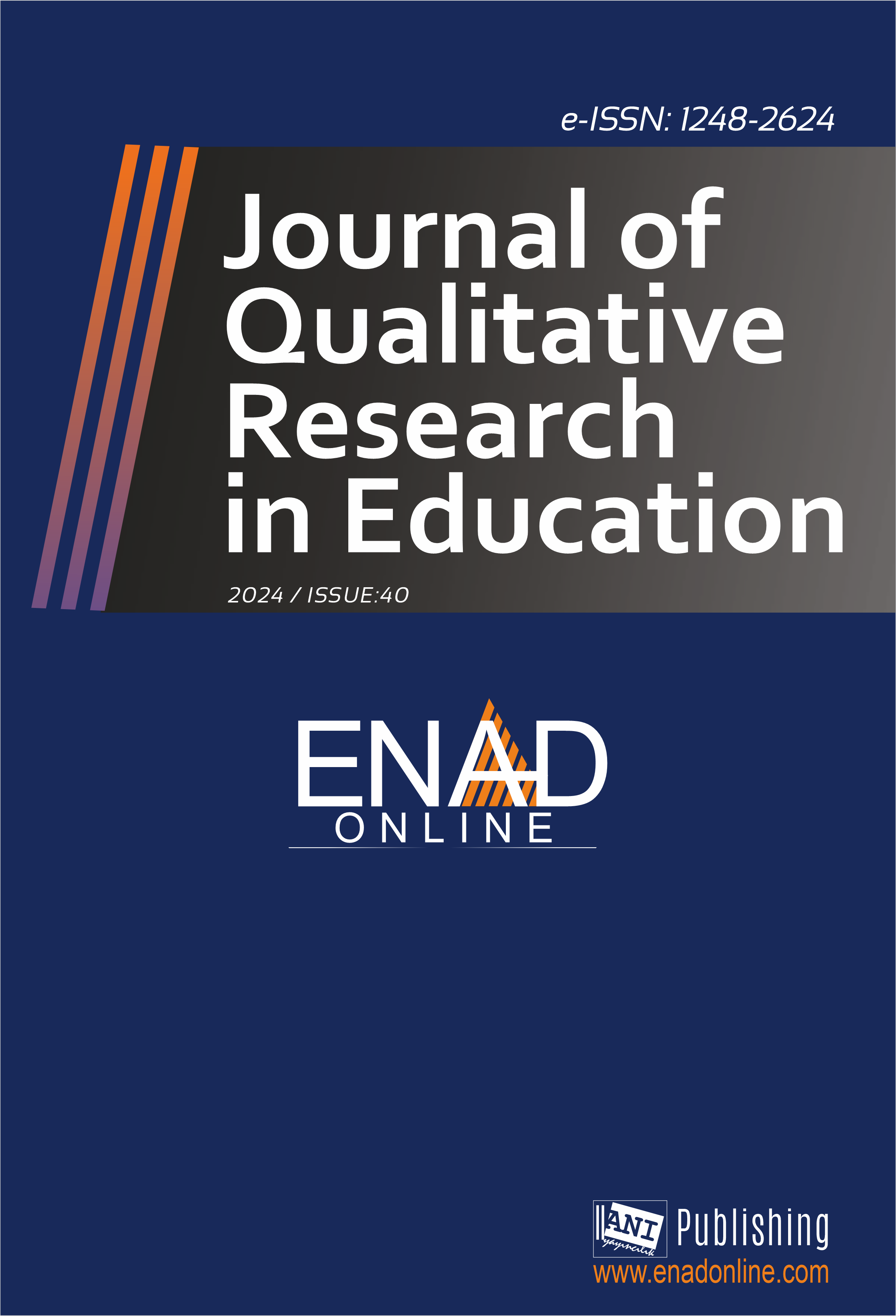Integration of Micro-Credentials into Higher Education: Faculty Perspectives
DOI:
https://doi.org/10.14689/enad.40.2010Keywords:
Micro-credit, extra-curricular competences, recognition of prior learning, European Qualifications Framework, Council of Higher EducationAbstract
The aim of this study is to examine the views and expectations of instructors regarding micro-competencies, which are believed to have a significant impact on the future of learning and teaching in higher education. In the study, which took a phenomenological approach based on qualitative research methods, interviews were performed with 12 faculty chosen using a criterion sample procedure and semi-structured interview forms. The collected data was evaluated using both content and descriptive analysis. As a result of the investigation, 12 themes emerged. As a result of the research, it was determined that micro-competencies have not been sufficiently conceptualized in higher education; micro-competencies are similar to various structures inside and outside the university; different models for their structuring are proposed; and potential problems are anticipated, as well as facilitating options for their implementation. Although it is known that policy and preparation studies are being carried out in the relevant institutions, it is hoped that the views of the faculties revealed as a result of the research will shed light on the integration of micro-competencies into higher education in a more qualified way.
References
Batdı, V. (2019). Öğrenme Modelleri Üzerine Araştırmalar. Nobel Yayıncılık.
Bigelow, A., Booth, C., Brockerhoff-Macdonald, B., Cormier, D., Dinsmore, C., Grey, S., Harrison, L., Hobbs, A., Lee, S., Maher, P., McArthur, F., Mitchell-Ashley, T., Mosley, J., Papple, J., Porter, J., Presant, D., Sommer, J., & Zahedi, E. (2022). eCampusOntario's Micro-credential Toolkit. https://openlibrary-repo.ecampusontario.ca/jspui/handle/123456789/1439
CEDEFOP. (2022). Microcredentials for Labour Market Education and Training: First Look at Mapping Microcredentials in European Labour-Market-Related Education, Training and Learning: Take-up, Characteristics and Functions. Luxembourg: Publications Office.
Che Ahmat, N., Ahmad Ridzuan, A., & Yunos, M. (2022). Perceptions and readiness of educators toward micro-credential certification programme. International Journal Of Education And Pedagogy, 4(1), 38-50. https://myjms.mohe.gov.my/index.php/ijeap/article/view/17571
Christensen, C. M., Raynor, M. E., & McDonald, R. (2015). Disruptive Innovation: In Practice. Harvard Business Review.
Clausen, J. M. (2022). Learning to fly: development and design of a micro-credentialing system for an educator preparation program in the absence of a required educational technology course. TechTrends, 66(276–286). https://doi.org/10.1007/s11528-021-00673-x
Creswell, J. W. (2005). Educational Research: Planning, Conducting, and Evaluating Quantitative and Qualitative Research. Pearson Education.
Creswell, J. W. (2017). Research Design: Qualitative, Quantitative, and Mixed Methods Approaches. Sage Publications.
European Commission. (2020). A European approach to micro-credentials. https://ec.europa.eu/education/education-in-the-eu/european-education-area/a-european-approach-to-micro-credentials_en
Fain, P. (2018). On-Ramps and Off-Ramps: Alternative Credentials and Emerging Pathways Between Education and Work. Inside Higher Ed.
Fong, J., Janzow, P., & Peck, K. (2016). Demographic Shifts in Educational Demand and the Rise of Alternative Credentials. Pearson Education & UPCEA. https://upcea.edu/wp-content/uploads/2017/05/Demographic-Shifts-in-Educational-Demand-and-the-Rise-of-Alternative-Credentials.pdf
Holon IQ. (2021). Micro Credentials Executive Panel Survey. https://www.holoniq.com/notes/micro-credentials-global-panel-results/
Kozanoğlu, D. (2021). Türkiye Yükseköğretim Sistemi İçin Uygun Bir Ulusal Mikro Sertifikalar Çerçevesi Arayışında Küresel Eğilimlere Genel Bir Bakış. M. Dalkılıç, & B. S. Yılmaz (Ed.) içinde, INSAC Social and Education Sciences (s. 767-785). Duvar Kitabevi.
Lumina Foundation. (2019). Certified Value: When do Adults without Degrees Benefit from Earning Certificates and Certifications? Strada Education Network. Lumina Foundation.
McGreal, R., & Olcott, D. (2022). A strategic reset: micro-credentials for higher education leaders. Smart Learning Environments, 9(9). https://doi.org/10.1186/s40561-022-00190-1
McGreal, R., Mackintosh, W., Cox, G., & Olcott, D. (2022). Bridging the Gap: Micro-credentials for Development: UNESCO Chairs Policy Brief Form – Under the III World Higher Education Conference (WHEC 2021). International Review of Research in Open and Distributed Learning, 23(3), 288–302. https://doi.org/10.19173/irrodl.v23i3.6696
Merriam, S. B. (2015). Qualitative Research: A Guide to Design and Implementation. Jossey-Bass.
MicroHE Konsorsiyumu. (2019). Challenges and Opportunities of Micro-Credentials in Europe: Briefing Paper on the Award, Recognition, Portability and Accreditation of Micro-Credentials. https://microcredentials.eu/wp-content/uploads/sites/20/2019/12/WP3-Interviews-with-Key-Stakeholders-Decision-Makers-verall-Summary-Report.pdf
Msweli, N. T., Twinomurinzi, H., & Ismail, M. (2022). The international case for micro-credentials for life-wide and life-long learning: a systematic literature review. Interdisciplinary Journal of Information, Knowledge, and Management, 17(151–190). https://doi.org/10.28945/4954
Murgatroyd, S. (2022). The Future is Small: Microcredentials and the Skills Agenda. Revista Paraguaya de Educación a Distancia, 3(1).
Olcott, D. (2021). Micro-Credentials: A Catalyst for Strategic Reset and Change in U.S. Higher Education. American Journal of Distance Education, 36(1), 19–35. https://doi.org/10.1080/08923647.2021.1997537
Oliver, B. (2021). A Conversation Starter: Towards a Common Definition of Micro-credentials. Paris: United Nations Educational, Scientific and Cultural Organization.
Oliver, B. (2022). Towards a common definition of micro-credentials. https://www.voced.edu.au/content/ngv:91634
Pelletier, K., Robert, J., Muscanell, N., McCormack, M., Reeves, J., Arbino, N., & Grajek, S., with Birdwell, T., Liu, D., Mandernach, J., Moore, A., Porcaro, A., Rutledge, R., & Zimmern, J. (2023). EDUCAUSE Horizon Report, Teaching and Learning Edition. Boulder, CO: EDUCAUSE.
Ralston, S. J. (2021). Higher education’s microcredentialing craze: A postdigital-Deweyan critique. Postdigital Science and Education, 3(83–101). https://doi.org/10.1007/s42438-020-00121-8
Ressei, C., Friedl, C., Staubitz, T., & Rohloff, T. (2019). Micro-credentials in EU and Global. https://www.corship.eu/wp-content/uploads/2019/07/Corship-R1.1c_micro-credentials.pdf
Romero-Llop, R., Castro-Jiménez, J. M., Fitó-Beltran, À., Valero-García, V., & Martín-Aragón, S. (2022). Higher education micro-credentials: A European university perspective. European Journal of University Lifelong Learning, 6(2), 53-59. https://doi.org/10.53807/0602pl0x
Stefaniak, J., & Carey, K. (2019). Instilling purpose and value in the implementation of digital badges in higher education. International Journal of Educational Technology in Higher Education, 16(44). https://doi.org/10.1186/s41239-019-0175-9
Thi Ngoc Ha, N., Spittle, M., Watt, A., & Van Dyke, N. (2022). A systematic literature review of micro-credentials in higher education: a non-zero-sum game. Higher Education Research & Development, 42(6), 1527–1548. https://doi.org/10.1080/07294360.2022.2146061
Yıldırım, A., & Şimşek, H. (2016). Sosyal Bilimlerde Nitel Araştırma Yöntemleri. Seçkin Yayıncılık.
Downloads
Published
How to Cite
Issue
Section
License
Copyright (c) 2024 Journal of Qualitative Research in Education

This work is licensed under a Creative Commons Attribution-NonCommercial 4.0 International License.




